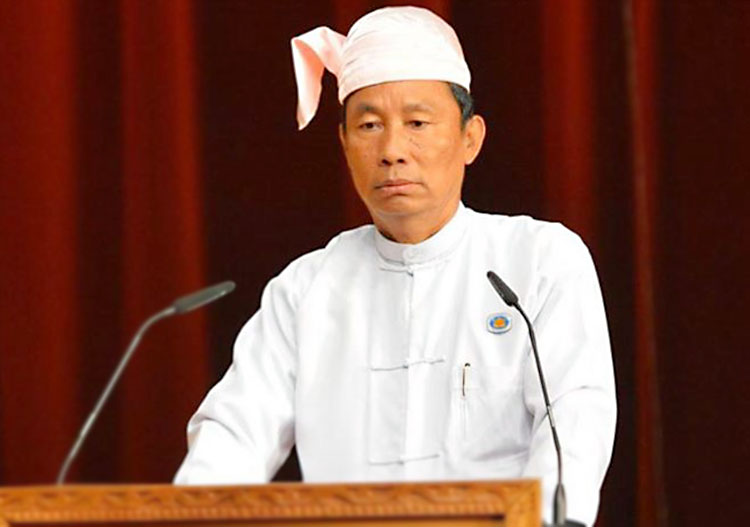Lower House speaker and chairman of the ruling Union Solidarity and Development Party Shwe Mann has been ousted from the party in a dramatic internal coup.
Shwe Mann was seen as a reformer in the government, and was considered a threat by military hardliners – and perhaps too close to opposition leader Suu Kyi for the party faithful’s liking.
Also purged by President Thein Sein was USDP General Secretary Maung Maung Thein.
Speaking to DVB on Thursday, the director of the President’s Office, Zaw Htay, said, “As far as I know, no arrests have been made. What I do know is that the president has transferred the position of joint-chairmanship to U Htay Oo.
“The transfer of chairmanship was done in accordance with the 2008 constitution, as well as the constitution of the party. The USDP leadership requested President Thein Sein to reform the party, and the president handed power to the most senior vice-chairman, U Htay Oo. [As president,] Thein Sein is restricted from involvement in party affairs. In the meantime, he will be acting joint chairman alongside U Htay Oo.”
The party’s general-secretary, Maung Muang Thein, appears to have become the second prominent victim in last night’s purge.
Speaking to DVB from his home in Naypyidaw, Maung Maung Thein said he had been informed that he was no longer needed, despite President Thein Sein holding an emergency meeting to address “urgent issues” within the party.
When asked about this morning’s meeting, he said the situation was “difficult to describe”.
“At the moment I am at home. I wasn’t at the meeting last night, and they are also holding a meeting right now which I have not been invited to. The situation is a bit hard to explain right now – it is complicated”, he said, adding that he did not know who was invited to the party meeting.
Asked to elaborate, Maung Maung Thein said, “I am no longer the party’s general secretary”.
Until his apparent political demise on Thursday, “Thura” Shwe Mann was widely regarded as both a powerful factional leader within Burma’s military and as a man who commanded the respect of elected parliamentary representatives.
The former Chief of General Staff of the Armed Services was seen to be third-in-command during the final days of Than Shwe’s un-quivering military leadership, according to US diplomatic cables procured and disseminated by WikiLeaks in 2007.
Shwe Mann earned the honorific “Thura” meaning “brave” for his military leadership in eastern Burma in the late 1980s, which included the Burmese army’s seizure of Manerplaw, the hitherto command-centre for the Karen insurgency.
But the man who the US believed would succeed junta-chief Than Shwe as Burma’s ruler was pushed down in the pecking order when a heavily criticised general election in 2010 paved the way for Naypyidaw’s new political elite. Shwe Mann became USDP chair and Lower House speaker, and suddenly inferior to fellow retired military general Thein Sein and Snr-Gen Min Aung Hlaing, who became president and army chief, respectively.
Shwe Mann used his position of speaker in Burma’s Lower House as a counterweight to hardline elements within the country’s military.
The reason that we couldn’t run the country democratically is because we didn’t have a parliament, and when we had parliament, it was in name only,” Shwe Mann told Radio Free Asia at the time of his appointment to the speaker’s chair.
“The current members of parliament must listen to the people’s voice and try to know the people’s feelings, attitude, and what they need. Then, it is the MPs’ job to implement it.”
The tactic was most clearly manifested in Shwe Mann’s personal and political relationship with Aung San Suu Kyi. The pair appeared close after the National League for Democracy leader won a parliamentary seat in 2012.
[related]
In June, a number of elected USDP parliamentarians voted in favour of repealing Article 436 of Burma’s constitution, which stipulates that a 75 percent parliamentary ‘yes vote’ is required to make further alterations to the nation’s charter. The clause effectively gives veto power to the military-appointed members, who hold 25 percent of seats in each chamber. The unelected soldiers exercised that de facto power to quash the reform.
Shwe Mann had previously ruled out adoption of charter changes before the election, which effectively put an end to a presidential bid by his newfound sympathiser Suu Kyi. But many in the military saw Shwe Mann’s weight among USDP parliamentarians as having influenced party members to vote out-of-step with military MPs.



